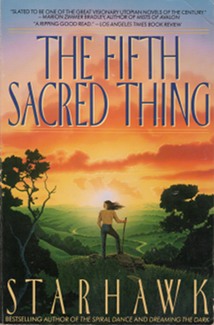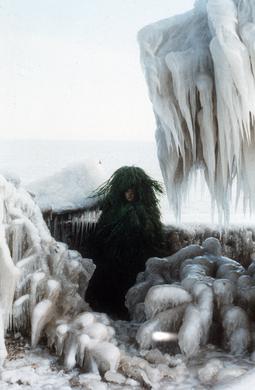Anarcho-primitivism, also known as anti-civilization anarchism, is an anarchist critique of civilization that advocates a return to non-civilized ways of life through deindustrialization, abolition of the division of labor or specialization, abandonment of large-scale organization and all technology other than prehistoric technology and the dissolution of agriculture. Anarcho-primitivists critique the origins and alleged progress of the Industrial Revolution and industrial society. According to anarcho-primitivists, the shift from hunter-gatherer to agricultural subsistence during the Neolithic Revolution gave rise to coercion, social alienation, and social stratification.
Dominator culture refers to a model of society where fear and force maintain rigid understandings of power and superiority within a hierarchical structure. Futurist and writer Riane Eisler first popularized this term in her book The Chalice and the Blade. In it, Eisler positions the dominator model in contrast to the partnership model, a more egalitarian structure of society founded on mutual respect among its inhabitants. In dominator culture, men rule over women, whereas partnership culture values men and women equally.

Starhawk is an American feminist and author. She is known as a theorist of feminist neopaganism and ecofeminism. In 2013, she was listed in Watkins' Mind Body Spirit magazine as one of the 100 Most Spiritually Influential Living People.
Donella Hager "Dana" Meadows was an American environmental scientist, educator, and writer. She is best known as lead author of the books The Limits to Growth and Thinking In Systems: A Primer.
Diane DiMassa is an American feminist artist, noted as creator of the alternative cartoon character Hothead Paisan, Homicidal Lesbian Terrorist, whose wild antics have been described as rage therapy for the marginalised. DiMassa is also active in oil painting and street art.
Susan Griffin is a radical feminist philosopher, essayist and playwright particularly known for her innovative, hybrid-form ecofeminist works.

Herman Edward Daly was an American ecological and Georgist economist and professor at the School of Public Policy of University of Maryland, College Park in the United States, best known for his time as a senior economist at the World Bank from 1988 to 1994. In 1996, he was awarded the Right Livelihood Award for "defining a path of ecological economics that integrates the key elements of ethics, quality of life, environment and community."

Stephen Gaskin was an American counterculture Hippie icon best known for his presence in the Haight-Ashbury district of San Francisco in the 1960s and for co-founding "The Farm", a spiritual commune in 1970. He was a Green Party presidential primary candidate in 2000 on a platform which included campaign finance reform, universal health care, and decriminalization of marijuana. He was the author of over a dozen books, political activist, a philanthropic organizer and a self-proclaimed professional Hippie.

The Fifth Sacred Thing is a 1993 post-apocalyptic novel by Starhawk. The title refers to the classical elements of fire, earth, air, and water, plus the fifth element, spirit, accessible when one has balanced the other four.
Charlene Spretnak is an American author who has written nine books on cultural history, social criticism, religion and spirituality, and art.

Environmental philosophy is the branch of philosophy that is concerned with the natural environment and humans' place within it. It asks crucial questions about human environmental relations such as "What do we mean when we talk about nature?" "What is the value of the natural, that is non-human environment to us, or in itself?" "How should we respond to environmental challenges such as environmental degradation, pollution and climate change?" "How can we best understand the relationship between the natural world and human technology and development?" and "What is our place in the natural world?" Environmental philosophy includes environmental ethics, environmental aesthetics, ecofeminism, environmental hermeneutics, and environmental theology. Some of the main areas of interest for environmental philosophers are:
Ecospirituality connects the science of ecology with spirituality. It brings together religion and environmental activism. Ecospirituality has been defined as "a manifestation of the spiritual connection between human beings and the environment." The new millennium and the modern ecological crisis has created a need for environmentally based religion and spirituality. Ecospirituality is understood by some practitioners and scholars as one result of people wanting to free themselves from a consumeristic and materialistic society. Ecospirituality has been critiqued for being an umbrella term for concepts such as deep ecology, ecofeminism, and nature religion.
A haiku in English is an English-language poem written in a form or style inspired by Japanese haiku. Like their Japanese counterpart, haiku in English are typically short poems and often reference the seasons, but the degree to which haiku in English implement specific elements of Japanese haiku, such as the arranging of 17 phonetic units in a 5–7–5 pattern, varies greatly.
Greta Gaard is an ecofeminist writer, scholar, activist, and documentary filmmaker. Gaard's academic work in the realms of ecocriticism and ecocomposition is widely cited by scholars in the disciplines of composition and literary criticism. Her theoretical work extending ecofeminist thought into queer theory, queer ecology, vegetarianism, and animal liberation has been influential within women's studies. A cofounder of the Minnesota Green Party, Gaard documented the transition of the U.S. Green movement into the Green Party of the United States in her book, Ecological Politics. She is currently a professor of English at University of Wisconsin-River Falls and a community faculty member in Women's Studies at Metropolitan State University, Twin Cities.
Ecological art is an art genre and artistic practice that seeks to preserve, remediate and/or vitalize the life forms, resources and ecology of Earth. Ecological art practitioners do this by applying the principles of ecosystems to living species and their habitats throughout the lithosphere, atmosphere, biosphere, and hydrosphere, including wilderness, rural, suburban and urban locations. Ecological art is a distinct genre from Environmental art in that it involves functional ecological systems-restoration, as well as socially engaged, activist, community-based interventions. Ecological art also addresses politics, culture, economics, ethics and aesthetics as they impact the conditions of ecosystems. Ecological art practitioners include artists, scientists, philosophers and activists who often collaborate on restoration, remediation and public awareness projects.
Marti Kheel was a vegan ecofeminist activist scholar credited with founding Feminists for Animal Rights (FAR) in California in 1982. She authored several books in deep ecology and ecofeminism, including Nature Ethics: An Ecofeminist Perspective and several widely cited articles in college courses and related scholarship, such as "The Liberation of Nature: A Circular Affair", "From Heroic to Holistic Ethics: The Ecofeminist Challenge", and "From Healing Herbs to Deadly Drugs: Western Medicine's War Against the Natural World". She was a long-time vegan in diet, lifestyle, and philosophical commitments, working out her understanding of its implications in every area of our human relationships with nature and its constituents, and she found a wide audience for those deep reflections. Reportedly, she had pursued a raw vegan diet later in her life. Her pioneering scholarship in ecofeminist ethics is foundational for continuing work in these fields.

Ecofeminism is a branch of feminism and political ecology. Ecofeminist thinkers draw on the concept of gender to analyse the relationships between humans and the natural world. The term was coined by the French writer Françoise d'Eaubonne in her book Le Féminisme ou la Mort (1974). Ecofeminist theory asserts a feminist perspective of Green politics that calls for an egalitarian, collaborative society in which there is no one dominant group. Today, there are several branches of ecofeminism, with varying approaches and analyses, including liberal ecofeminism, spiritual/cultural ecofeminism, and social/socialist ecofeminism. Interpretations of ecofeminism and how it might be applied to social thought include ecofeminist art, social justice and political philosophy, religion, contemporary feminism, and poetry.

Ecofeminist art emerged in the 1970s in response to ecofeminist philosophy, that was particularly articulated by writers such as Carolyn Merchant, Val Plumwood, Donna Haraway, Starhawk, Greta Gaard, Karen J. Warren, and Rebecca Solnit. Those writers emphasized the significance of relationships of cultural dominance and ethics expressed as sexism (Haraway), spirituality (Starhawk), speciesism, capitalist values that privilege objectification and the importance of vegetarianism in these contexts (Gaard). The main issues Ecofeminism aims to address revolve around the effects of a "Eurocentric capitalist patriarchal culture built on the domination of nature, and the domination of woman 'as nature'. The writer Luke Martell in the Ecology and Society journal writes that 'women' and 'nature' are both victims of patriarchal abuse and "ideological products of the Enlightenment culture of control." Ecofeminism argues that we must become a part of nature, living with and among it. We must recognize that nature is alive and breathing and work against the passivity surrounding it that is synonymous with the passive roles enforced upon women by patriarchal culture, politics, and capitalism.
Gloria Feman Orenstein is a feminist art critic, pioneer in the field of the women of Surrealism and scholar of ecofeminism in the arts. Orenstein's Reweaving the World is considered a seminal ecofeminist text which has had "a crucial role in the development of U.S. ecofeminism as a political position".

Fern Shaffer is an American painter, performance artist, lecturer and environmental advocate. Her work arose in conjunction with an emerging Ecofeminism movement that brought together environmentalism, feminist values and spirituality to address shared concern for the Earth and all forms of life. She first gained widespread recognition for a four-part, shamanistic performance cycle, created in collaboration with photographer Othello Anderson in 1985. Writer and critic Suzi Gablik praised their work for its rejection of the technocratic, rationalizing mindset of modernity, in favor of communion with magic, the mysterious and primordial, and the soul. Gablik featured Shaffer's Winter Solstice (1985) as the cover art for her influential book, The Reenchantment of Art, and wrote that the ritual opened "a lost sense of oneness with nature and an acute awareness of ecosystem" that offered "a possible basis for reharmonizing our out-of-balance relationship with nature."







